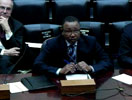
The House Committee on Foreign Affairs met this week for the first time since the start of the 112th Congress, and Sudan took center stage. The committee expressed its optimism at the peaceful recent voting period, but then quickly shifted focus to the many challenges that remain in Sudan. Enough advisor Omer Ismail testified (pdf of testimony here) before the committee detailing these remaining post-referendum issues and the role the U.S. government must continue to play in the region moving forward. The committee also heard testimony from the State Department’s Special Advisor for Sudan Princeton Lyman (pdf) and former U.S. Special Envoy to Sudan Richard Williamson (pdf).
Testifying first, Lyman addressed many of the concerns raised by Chairwoman Ileana Ros-Lehtinen (R-FL) (pdf) and Ranking Member Howard Berman (D-CA) in their opening remarks. He reiterated the need for continued engagement with both the North and South Sudan, especially when it comes to the issues surrounding Abyei, popular consultations in Blue Nile and Southern Kordofan, and the violence in Darfur. He emphasized that the United States has been and will continue to be engaged in the region because “instability is not in our interest.”
Further, Lyman spoke to the concerns expressed by many Republicans on the committee about the Obama administration’s roadmap for peace and the various incentives offered to Khartoum—specifically, the removal of Sudan from the State Sponsors of Terrorism List, or SSTL. He reiterated that Sudan would not be removed from the SSTL without a robust review process as required by law, without full compliance with all the provisions of the CPA, and without assurance that Sudan was not harboring terrorist groups such as the Lord’s Resistance Army. Removal from the SSTL would be contingent upon concrete actions taken by Khartoum and not just stated promises, he said.
Following Lyman, Ismail delivered poignant and targeted testimony stressing, as President Obama recently did in a New York Times op-ed, that the referendum is just a beginning step toward achieving lasting peace and security in Sudan. He emphasized that now is the time to build on the current momentum in Sudan and work to address three pertinent issues that persist. Specifically, the relationship between the North and the South must be clarified before the two regions officially separate in July—including agreements upon border demarcation, citizenship rights, and economic arrangements. Further, the conflict in Darfur must be reprioritized. Thirdly, both the North and the South must work to create governments that value pluralism and inclusivity.
The peaceful referendum in South Sudan is an accomplishment worthy of praise, and the U.S. government and other international actors deserve recognition for prioritizing and supporting the voting process. But as the testimony before the House Foreign Affairs committee made abundantly clear, some of the toughest and most sensitive issues lay ahead. As Ismail told the committee, potential for violence remains high. “We must work to avoid that flash from happening,” he said. Continued diplomatic engagement from the highest levels will be required to ensure that negotiation continues on these issues during the six-month interim period before formal secession in July.
Video of the full hearing is posted here.
Photo: Enough policy advisor Omer Ismail testifies for the House Foreign Affairs Committee as State Department Sudan advisor Princeton Lyman looks on

